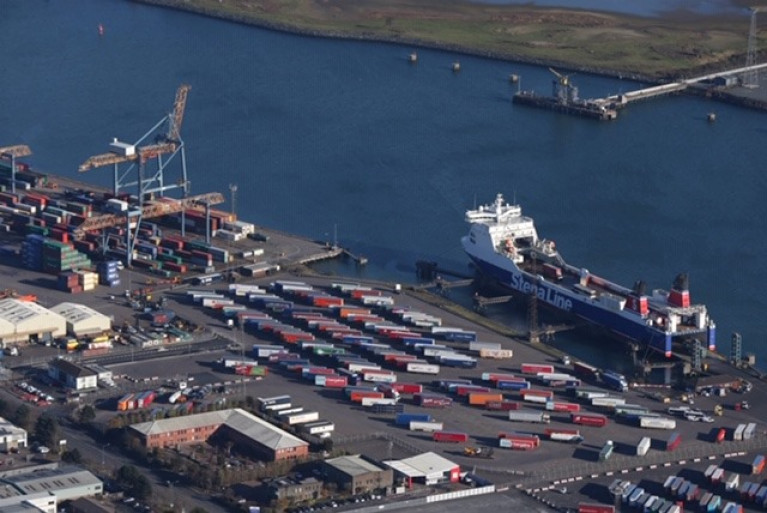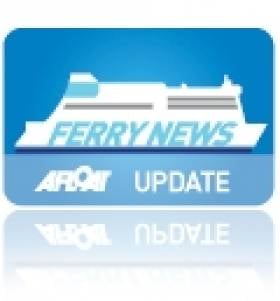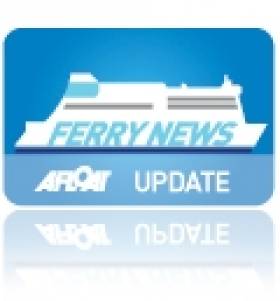Displaying items by tag: BelfastLiverpool
Ferry Firm Stena Line Reduces Freight Capacity as Covid-19 Impacts Belfast-Liverpool Volumes
Ferry operator Stena Line has announced that it will be reducing freight capacity on its Belfast - Liverpool (Birkenhead) service due to a decline in freight demand as a consequence of the Coronavirus crisis.
As a result the freight only vessel Stena Forecaster will be removed from service resulting in a reduction of 10 trips per week.
Paul Grant, Stena Line’s Irish Sea Trade Director said: “Since the start of the Coronavirus crisis we have been closely monitoring the market and adapting our capacities to meet the prevailing demand.”
On March 9th, Stena Line launched its largest ship ever on the Belfast – Liverpool route, the brand-new Stena Edda. The newbuild replaced the smaller Stena Lagan and at the time increased capacity for both freight and travel customers.
In early 2021, Stena Line will replace Stena Mersey with a further new ship, Stena Embla. These two new RoPax ferries will increase freight capacity by almost 30% and will double passenger capacity compared with the vessels they replace.
Paul Grant added: “From 2021, a combination of the two largest ships ever to sail between Belfast and Liverpool, Stena Edda and Stena Embla will help us to grow our freight and travel business. Stena Edda and Stena Embla will raise onboard facilities to a whole new level, with 175 cabins including six suites plus enhanced freight facilities and faster loading and disembarkation processes. Despite all of the current difficulties Stena Line remains confident about the future and are well placed to respond to customer and market demands.”
#ferries - Operator Stena Line has achieved another major milestone in its fleet investment program with the ‘float out’ ceremony of the second vessel in its next generation E-Flexer series.
The second vessel will be named Stena Edda* and follows the Scandinavian heritage decided for the five new vessels that are being constructed at the Avic Weihai Shipyard in China.
Stena Edda is scheduled to enter service on the Belfast-Liverpool route in spring 2020. This is the second of three new E-Flexer vessels bound for the Irish Sea during 2020 and 2021 which represents a significant multi-million pound investment by Stena Line in the region. See related story on the first E-Flexer Stena Estrid to serve Dublin-Holyhead.
The ‘float out’ ceremony of Stena Edda started at 13.18 hrs local Weihai time today (15th April) and at 18.00 Stena Edda floated out of the dock. The timings were chosen especially because 18 is a number associated with good fortune in China.
Stena Line CEO Niclas Mårtensson said: “It’s very exciting to follow the building process and this is another very important milestone in our rolling construction programme. This investment underscores our commitment to our operations on the Irish Sea and our determination to deliver the best possible freight and travel experience for our customers. This is a very exciting time for our business and I’m proud that as Europe’s largest ferry company, Stena Line continues help shape the industry for the next generation of freight and leisure passengers.”
At 215 metres, all three vessels being built for the Irish Sea will be larger than today’s standard RoPax vessels and will provide freight capacity of 3,100 lane meters and the space to carry 120 cars and 1,000 passengers and crew. For the Belfast – Liverpool route capacity will increase by almost 20% compared to the current vessels in service. The next generation vessels have been designed in line with the Stena Line strategic commitment to sustainability and will be highly fuel efficient to help reduce emissions. The vessels will also feature a digitally enhanced customer experience.
“Stena Edda will deliver many benefits to our freight and travel customers including faster and easier loading/unloading with drive through decks and new port infrastructures. Our latest design in cabins and further enhancement of our Scandinavian inspired interiors will make these new ships the largest, most spacious and most comfortable ever to sail between Belfast and Liverpool,” said Paul Grant, Stena Line’s Trade Director, Irish Sea North.
In addition to the three Irish Sea bound E-Flexer vessels, Stena Line has also ordered a further two E-Flexer RoPax vessels with a larger design, to be deployed within Stena Line’s network in 2022. These larger ships will be 240 meters long with a total freight capacity of 3,600 lane meters, and passenger capacity of 1,200. Stena's sister company Stena RoRo is managing all the E-Flexer building projects that are ongoing on Avic Weihai Shipyard.
*Stena Edda - the Edda is an old Norse term that refers to a central medieval collection of poems and divine mythology.
#FerryNews - Captain Marcel Schaar of the ro-ro freightferry Stena Forerunner was welcomed to Belfast Harbour this week by the port's CEO Joe O’Neill and Anna Breen, Stena Line's Freight Commercial Manager (Irish Sea North).
The inaugural call of the 4Runner Mk II class freighter was marked by a plaque ceremony ahead of the ferry’s first sailing from Belfast to Liverpool.
The 3,000 lane metre Stena Forerunner (tracked by Afloat from the North Sea at the weekend: see related safety award) has been introduced as a result to growing market demand. In addition the need for increased capacity will increase weekly freight capacity on the service by almost 10%.
Paul Grant, Stena Line Trade Director commented: “We are delighted to welcome the Stena Forerunner to Belfast and the introduction and investment of this larger vessel demonstrates our ongoing commitment to the freight market. This year we’re experiencing strong growth of 6% on the Belfast to Liverpool route and future plans include the introduction of two new build ferries on this service during spring 2020 and early 2021.”
Afloat adds the introduction of Stena Forerunner, which previously operated Harwich-Rotterdam follows the deployment earlier this month of another North Sea freightferry, Stena Scotia, see related coverage. The 1,692 lane metre capacity vessel which incidentally served the Irish Sea returned to familiar waters initially to cover sister Stena Hibernia when drydocked in Harland & Wolff.
Irish Authorities Approve Stena / DFDS Merger
Of the two services, the Belfast-Liverpool (Birkenhead) is for passengers and freight while the and Belfast-Heysham port route is exclusively for freight-only users. To read more about the decision from the authority click here.
In February the UK's Office of Fair Trading (OFT) referred Stena AB's acquisition from DFDS A/S to the Competition Commission, conclusions on the report are not expected to be made until 25 July. To read more about the merger click here.
In the meantime the Belfast-Liverpool (Birkenhead) route continues trading under the name of Stena Line Irish Sea Ferries Ltd which is separately operated to Stena Line's other Irish Sea routes.
Sailings on the 8-hour route are run by the Italian built 27,510 tonnes ro-pax twins Lagan Seaways and Mersey Seaways which have been in service since the newbuilds were launched in 2005.
As the acquisition remains subject to regulatory clearance, passengers intending to travel on the route can continue to make bookings through the DFDS Seaways website by logging onto this link.
In addition the acquisition involved the sale of the South Korean built freight-ferries Hibernia Seaways and Scotia Seaways which operate Belfast-Heysham sailings.
Stena to Re-Introduce HSS this Week
Stena Line's HSS fast-ferry the Stena Explorer will be re-introduced on its Dun Laoghaire to Holyhead route this Friday, writes Jehan Ashmore.
The HSS (High Speed Service) operated 19,638 tonnes craft will run between 1 April to 13 September to cope with the additional demand over the summer period.
A single daily round trip is scheduled with a 10.00 hours sailing from Holyhead and a 13.15 hours sailing from Dun Laoghaire. Passage time is 120 minutes (2 hours).
The HSS can 350 vehicles and with 1500 passengers, the craft can handle higher volumes of seasonal summer foot passengers compared to the last route serving vessel, the 4,113 tonnes Stena Lynx III. The return of the HSS service links in with those intending to make onward journeys from Dun Laoghaire's DART commuter rail service to Dublin city centre and beyond on the national rail network.
Up to early January the route had been served by the Stena Lynx III which remains moored alongside Dun Laoghaire's St. Michaels Wharf. The craft which can take 627 passengers and 120 cars and marketed as the Stena 'Express' is to resume high season sailings starting in July between Rosslare-Fishguard.
In total the company carries over two million passengers on its four Irish Sea routes each year. An additional route between Belfast-Liverpool (Birkenhead) was taken over by the Swedish owned ferry company from DFDS Seaways late last year, is subject to regulatory clearance.
Until such clearance has been granted, this route will be operated separately from all other Stena Line routes. In the meantime the company advise until further notice to make bookings which will remain acceptable through the use of the DFDS website.































































